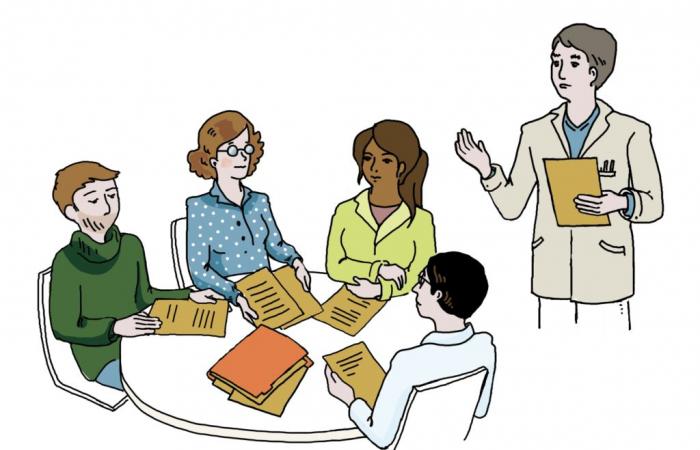Being concerned about how you will be treated is legitimate. On this point, know that the choice of your therapeutic strategy is based on a collegial and well-oiled system: the multidisciplinary consultation meeting.
Chemotherapy for you, no chemo for others who have the same cancer. You received one or more treatments before the tumor operation, while some women will receive them after. Then you had to undergo a certain number of radiotherapy sessions… How was your treatment decided? By whom? Or ? When? You may have asked yourself these questions when leaving the consultation with the oncologist or surgeon who announced your treatment protocol to you.
Tell yourself that it is not him, alone, who developed the therapeutic strategy that concerns you. “ Today, in France, no treatment can be decided by a single doctor on a corner of the table”explains Professor Mario Campone, medical oncologist and general director of ICO, the Western Cancer Institute. “ It is necessarily the result of a collegial decision resulting from the multidisciplinary consultation meeting, the RCP. »
For you, as for each of the 385,0001 new cases of cancer diagnosed per year in France, several doctors have come together to discuss your situation in order to offer you the most suitable treatment. “ That is to say, taking into account both scientific recommendations and benchmarks and the particular case of the person, their medical, psychological, social specificities…”specifies Dr Jean-Baptiste Méric, medical oncologist at the Bligny hospital center.
Although the multidisciplinary team has always existed informally in many cancer centers, there has long remained a great disparity in treatment from one establishment to another. To remedy this and guarantee that everyone is treated equally everywhere in France, in the public as well as in the private sector, the National Cancer Institute (INCa) institutionalized CPR in 2005.
At the crossroads of expertise
In the presence of its members or by videoconference, the CPR is generally held in the days following the announcement of the diagnosis. Breast CPR, gynecological CPR… it is organized thematically, and solicits the expertise of appropriate specialists – medical oncologist, surgeon, radiotherapist, anatomopathologist… How many participants? Three at least, but most often it brings together several teams. “ In a living area, it is common for public or private establishments, clinics or hospitals to organize themselves to carry out joint CPR », underlines Professor Campone. Each file is presented by the referring doctor, who also sends to all participants in the meeting a form where all the information concerning the patient is recorded – comorbidities, personal elements, etc. Most of the time, as the cases correspond to standard treatments based based on national and international scientific standards, the therapeutic proposal is quickly made.
However, certain situations require more specialized advice. For example, rare cancers, which benefit from a particular network for specific, national, sometimes even European, RCP. This is also the case for all tumors of specific organs – esophagus, stomach, liver, rectum and ovaries – whose files must be sent to establishments authorized to treat these tumors to be examined in so-called recourse RCP. The RCP’s opinion is transcribed into the personalized care plan (PPS). Choice of treatments, schedule, side effects… This is what the referring doctor detailed to you during your face-to-face consultation, before asking for your agreement, a sine qua non condition for the implementation of the strategy. therapeutic. At the end of this meeting, you may have been given a paper copy of your PPS, but this is not always the case. If, along the way, it proves necessary to adapt or modify the treatment lines, new RCPs may then be convened. “ CPR provides an optimal guarantee that all therapeutic options have been analyzed and that the one most suited to the patient’s individual situation has been selected. », insists Dr Méric.






